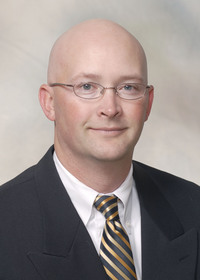Information Possibly Outdated
The information presented on this page was originally released on February 24, 2017. It may not be outdated, but please search our site for more current information. If you plan to quote or reference this information in a publication, please check with the Extension specialist or author before proceeding.

Bill Evans, a Mississippi State University researcher with the Mississippi Agricultural and Forestry Experiment Station, discussed research and education priorities with representatives of the fruit and nut commodity group on Feb. 22, 2017. MSU Extension Service specialists and agents also took part in the annual MSU Central Mississippi Producer Advisory Council meeting in Raymond, Mississippi. (Photo by MSU Extension Service/Susan Collins-Smith)
Producers share priorities with MSU scientists, agents
RAYMOND, Miss. -- Agricultural producers and industry professionals in central Mississippi met with agents and research scientists of the Mississippi State University Extension Service and Mississippi Agricultural and Forestry Experiment Station Feb. 22 to share input and give feedback.
The Central Mississippi Producer Advisory Council meeting was held in conjunction with Hinds Community College and the Alcorn State University Extension.
“This meeting provides a forum for effective communication between producers, industry professionals and our university researchers and county agents,” said Sherry Surrette, MSU Central Mississippi Research and Extension Center head. “We want to know if we are doing a good job of meeting our clients’ needs, are there things we can do better, or are there needs we should address.”
Producers from eight commodity groups met in breakout sessions to discuss priorities for the coming year. Commodities represented were beekeeping, vegetables, dairy, agricultural crops, forestry and wildlife, fruits and nuts, home gardening and ornamentals, and beef, equine and forages.
Despite state budget woes, Extension and Experiment Station leaders are committed to serving Mississippi’s citizens.
“MSU is called the people’s university because we do more for grassroots people in the state than any other university in the state,” said Reuben Moore, Experiment Station associate director. “The budget issues our state is facing could affect some of today’s recommendations. However, we will strive to continue to address the issues you face and figure out a way to meet your needs despite the cuts.”
Bill Herndon, associate vice president for the MSU Division of Agriculture, Forestry and Veterinary Medicine, said it is critical for the university to understand which needs are most important during lean budget years.
“We want to make sure we focus on what you need, and this meeting helps us set our priorities,” Herndon said.
The agricultural crops group requested new variety trial locations and information on new pesticides and herbicides, insect threshold changes, and soil fertilization and cover crop resources.
Beekeepers requested help developing a system to deliver improved bee stocks to Mississippi beekeepers, and they asked for more research on small hive beetles. Beekeepers said they would like to see continuing development in the Honey Bee Stewardship Program.
The beef, equine and forages group asked for continued research on summer forages, research on the difference in fall and spring calving expenses, research on phosphorus management in grazing systems, and information on international marketing opportunities for large and small producers.
Dairy representatives said they want more Extension publications, on-farm workshops, and education on employee management, immigrant workers, and calf replacement and handling. They requested input and education on the Farm Bill Dairy Title. They also expressed a need for publications written in Spanish.
Members of the forestry and wildlife group said they want to establish a technical group to better advise the Mississippi Development Authority on the inventory database to use in attracting new investments. They also asked for continued development of educational programs on alternative income for landowners.
The fruits and nuts group requested educational programs on orchard floor management and irrigation and spraying technology and use.
Home gardening and ornamental representatives requested variety trials on unusual plants, development of accreditation standards for professional landscapers, and advanced Master Gardener training on topics such as organic gardening.
Vegetable producers asked for more education on improved crop pollination with bees, control of pigweed and morning glory, and fertilization methods and practices.

Bill Evans, a Mississippi State University researcher with the Mississippi Agricultural and Forestry Experiment Station, discussed research and education priorities with representatives of the fruit and nut commodity group on Feb. 22, 2017. MSU Extension Service specialists and agents also took part in the annual MSU Central Mississippi Producer Advisory Council meeting in Raymond, Mississippi. (Photo by MSU Extension Service/Susan Collins-Smith)




















